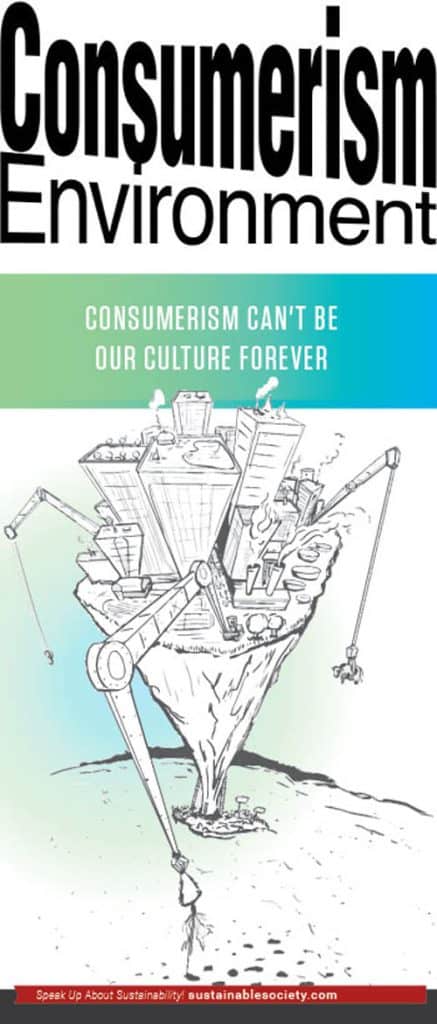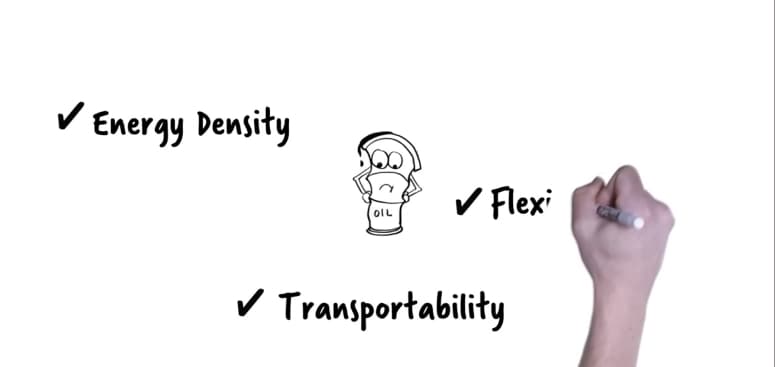“Our enormously productive economy demands that we make consumption our way of life, that we convert the buying and use of goods into rituals, that we seek our spiritual satisfaction and our ego satisfaction in consumption. We need things consumed, burned up, worn out, replaced and discarded at an ever-increasing rate.”
Economist Victor Lebow writing in The Journal of Retailing in 1955, quoted by Richard Heinberg in his book “Afterburn”.
As offensive as the statement above might be to many people, it fairly sums up the direction our society has taken in the past century. We are currently locked into a pattern of high and ever-growing consumption obvious to the impacts on the planet and on the health of our society and the people in it.
Our endless consumption takes the form of:
- throw-away or disposable goods
- large houses
- expansive suburbs
- our globe-trotting travel habits
- large, powerful cars driven great distances
All point to an expectation of endless consumption without penalty. The growth-forever paradigm serves the elites well as it creates the conditions under which their wealth will grow the fastest. For the remainder of the population, a fascination with material goods masks the underlying weaknesses of:
- debt
- resource depletion
- long work hours
- diminishing quality of life
The fantasy of a retail economist of the 1950’s can no longer form the guiding light of a progressive society in 2016. Over-consumption lies at the heart of many of our current fiscal, social and environmental problems. The metrics by which a consumer society is controlled are completely distorted optics for viewing national and individual welfare.
As we move towards a conserver society, we can more plainly see how unsustainable consumerism is and how counter to social progress it has driven us.
Beyond a certain point, more material wealth and comfort do not make people happier. This fact has been established in numerous studies. The level of wealth required for broad-based happiness and life satisfaction is perhaps half of what the citizens of the more industrialized nations currently enjoy. However, it is just as clear that elites derive maximum profit and power from maximum consumption and its related economic activity.
By creating the most goods for the least assignable costs, consumerism and its henchman, globalism, have created an extremely complex interdependent trading system. Such a system does indeed produce massive amounts of goods but it also diminishes the base of the economies who participate in it and leaves them open to severe damage should disruption in long supply lines of vital materials including food and energy occur.
Some excellent studies have identified the impacts of such disruptions on past civilizations. The effects are devastating. Depending too heavily on trade, specializing to too high of a degree and creating complex financial systems has planted the seeds of collapse in many of the advanced civilizations for which records are available. The research which spawned the book 1177 BC, The Year Civilization Collapsed. By Erich H. Cline establishes this pattern of collapse of the advanced societies of the Mediterranean . This is the earliest example for which adequate records are available.
Geoffrey Parkers “Global Crisis” covers the societal collapses which occurred around the world in the 17th century. The incredible detail and clarity of the mechanism of trade and social disintegration are made possible by the comparative wealth of documentation which Parker had to work with. Cline, by comparison, had to employ far more detective work, much of it based on archaeology.
The inability to change is the highlight of many records of societal decline and the more narrow the economic base, the more the decision making is in the hands of an elite whose fortunes are tied to that same base. It becomes very difficult for the society to decide to take power and resources away from that base and diversify the economy especially when the elite is under pressure from declining returns from its core business.
Long, energy intensive supply lines for vital resources, a narrow economic base with its attendant narrow tax base, coupled with complex flows of fiat currency is a house of cards waiting for a breeze. History mostly deals with the wars, revolutions and social drama which play out in the aftermath of a consumer society coming to terms with its inability to produce what it needs to sustain itself.
Any society which places consumption ahead of production, investment and conservation of its resources is inevitably going to experience a dramatic and possibly rapid transformation into a broader based economy and more egalitarian way of life. This new societal norm may well be at a far lower level of sophistication than would have been possible had the previous society championed sustainability rather than consumption.
- The BBC – It has been suggested that if everyone on the planet consumed as much as the average US citizen, four Earths would be needed to sustain them.
- OpEdNews – “Today, in view of the common good, there is urgent need for politics and economics to enter into a frank dialogue in the service of life, especially human life. Saving banks at any cost, making the public pay the price, forgoing a firm commitment to reviewing and reforming the entire system, only reaffirms the absolute power of a financial system, a power which has no future and will only give rise to new crises after a slow, costly and only apparent recovery.”



